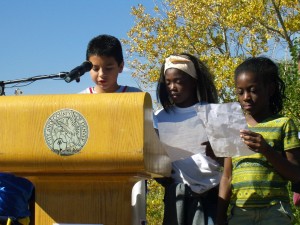Resolution to Advance Service-Learning

Originally appears in the Fall 2007 issue
Thirty years ago this October, delegates from 66 nations adopted the Tbilisi Declaration, perhaps the most seminal document in environmental education. It is not exaggerating to say that most readers of this magazine wouldn’t have their jobs if it weren’t for the bold work of those visionary leaders who penned a multinational, intergovernmental acknowledgement of the necessity for high-quality environmental education. Yet, in spite of valiant efforts by tens of thousands of devotees over the years, environmental education (EE) can still do more to realize its potential. Few would deny that EE still too often emphasizes information over educational process. That this information is still too often seen as unbalanced. That EE is still too often unable to demonstrate that it can empower participants with the skills to take personal and collective action for the common good.
In honor of the roadmap charted by those in Tbilisi, I offer below a government-style resolution to optimize the effectiveness of EE by urging environmental educators to incorporate a pedagogical approach that is tailor-made for EE: service-learning. To be sure, most environmental educators are somewhat familiar with service-learning, but the aim here is to galvanize us, formal and nonformal environmental educators alike, around the notion that we can and should do more to use this very promising vehicle to our advantage.
This content is restricted to subscribers only.
If you are not yet a subscriber, please consider taking out a subscription here.
If you are an existing subscriber, kindly log in or contact us at info@greenteacher.com for more information.





